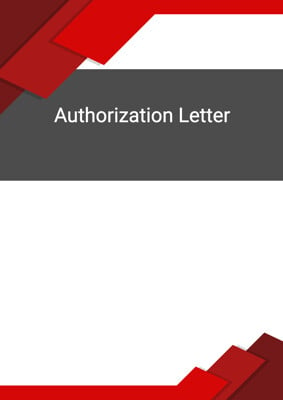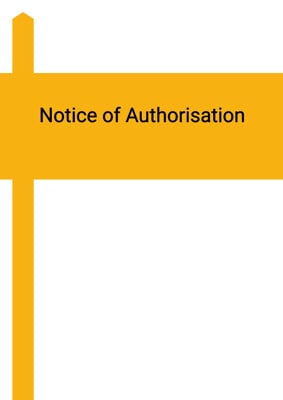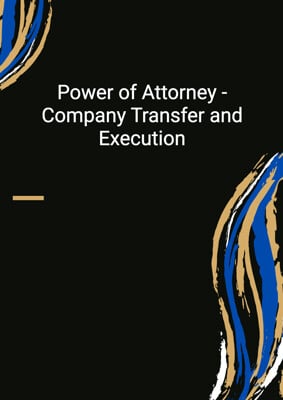How to Tailor the Document for Your Need?
01
Create Document
Fill in the details of the parties. You can click the "Fill with Member’s Information" button to complete it with information saved to your account.
02
Fill Information
Please fill in any additional information by following the step-by-step guide on the left hand side of the preview document and click the "Next" button.
03
Get Document
When you are done, click the "Get Document" button and you can download the document in Word or PDF format.
04
Review Document
The document should be signed by the authorised signatory (or directors of a company) and witnessed to complete the formality.
Document Preview
Document Description
The Power of Attorney - Company document is a legal document that grants authority to a designated individual, referred to as the attorney, to act on behalf of the principal in a specific transaction. This document is made in connection with a transaction, and it appoints the attorney as the true and lawful representative of the principal. The attorney is authorized to perform all acts and execute all documents necessary or advisable in relation to the transaction.
The document begins by identifying the parties involved, namely the principal and the attorney. It also specifies the principal's address and states that the attorney is appointed on behalf of the principal. The purpose of the document is to grant the attorney the power to negotiate, sign, execute, deliver, and issue the proposed agreement between the principal and the counterparty. The attorney is also authorized to negotiate, execute, deliver, and issue any other document, notice, instrument, or communication required for the principal to fulfill its obligations under the agreement.
The document provides flexibility depending on certain conditions. If the 'negotiate' variable is set to 'yes', the attorney is authorized to negotiate and amend the agreement as they see fit. However, if the 'negotiate' variable is set to 'no', the attorney is only authorized to sign, execute, deliver, and issue the agreement in the form of the draft annexed to the deed. The document also allows for the receipt of a specified currency amount from the counterparty, if applicable.
The principal is granted the right to consult legal or other advisers regarding the deed or any matters arising from it. Additionally, the document allows for the appointment and removal of a substitute attorney or the delegation of powers to an agent. The attorney is entitled to remuneration for their services, which may also extend to the substitute or agent, depending on the 'substitute' variable.
The document specifies the duration of its effect. If the 'irrevocable' variable is set to 'yes', the deed is irrevocable for a specified period of time. However, if the 'irrevocable' variable is set to 'no', the deed is only effective for the specified period. During this period, acts performed and documents executed or signed by the attorney in good faith are considered valid and binding on the principal and its successors and assigns.
The principal may choose to provide indemnity to the attorney and their agents, undertaking to cover any actions, proceedings, claims, costs, expenses, and liabilities arising from the exercise of the powers conferred by the deed. The principal also ratifies and confirms any actions taken by the attorney in connection with the transaction and agrees to ratify and confirm any other actions taken under the authority of the deed.
The document states that it is permitted by the principal's constitutional documents and is governed by the laws of the jurisdiction state. It is executed by the principal and witnessed by a third party.
In summary, the Power of Attorney - Company document grants authority to an attorney to act on behalf of the principal in a specific transaction. It outlines the powers and responsibilities of the attorney, the duration of the deed, and the indemnity provided by the principal. It is a legally binding document that ensures the smooth execution of the transaction and protects the interests of both parties involved.
How to use this document?
1. Identify the parties: Enter the names and addresses of the principal and the attorney in the designated fields.
2. Specify the transaction details: Describe the transaction for which the power of attorney is being granted.
3. Grant authority to the attorney: Authorize the attorney to negotiate, sign, execute, deliver, and issue the proposed agreement between the principal and the counterparty. If negotiation is not required, specify that the attorney should sign, execute, deliver, and issue the agreement in the form provided.
4. Allow for receipt of payment: If applicable, specify the amount of currency to be received from the counterparty and authorize the attorney to give a valid receipt and discharge for that sum.
5. Consult legal or other advisers: Grant the principal the right to seek advice from legal or other advisers regarding the deed or any related matters.
6. Consider appointment of a substitute: Decide whether to allow the attorney to appoint and remove a substitute or delegate powers to an agent. Specify the terms and conditions, if applicable.
7. Determine the duration of the deed: Choose whether the deed is irrevocable for a specified period or effective for a specified period. Clarify the consequences after the specified period.
8. Provide indemnity, if desired: Decide whether to indemnify the attorney and their agents against any actions, proceedings, claims, costs, expenses, and liabilities arising from the exercise of the powers conferred by the deed.
9. Ratify and confirm actions: Agree to ratify and confirm any actions taken by the attorney in connection with the transaction and any other actions taken under the authority of the deed.
10. Execute the deed: Sign the deed and have it witnessed by a third party.
Note: This guidance provides a general overview of using the Power of Attorney - Company document. It is important to consult with legal professionals to ensure compliance with applicable laws and regulations.
Not the right document?
Don’t worry, we have thousands of documents for you to choose from:
























